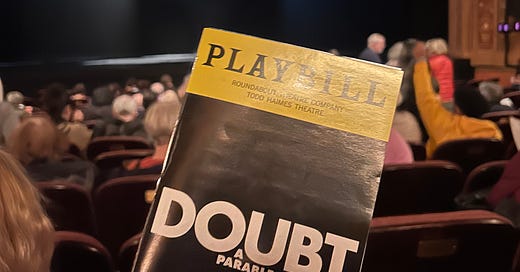“Doubt” Is a Sickening Retelling of a Familiar Tale
My mom came because she loves Liev Schreiber, which was absolutely correct.
Roundabout Theater’s revival of “Doubt” conjures up feelings of “existential nausea,” to quote Liev Schreiber, the show’s main actor. This is not a critique; this is a sincere compliment.
To evoke such feelings of anxiety 20 years after the show originally premiered — and 60 years from when the plot takes place — is a testament largely to the strength of the script, written by John Patrick Shanley. It helps that the performances by the revival’s four actors are all on the nose, solid, and perfectly unsettling.
“Doubt” takes place in 1964 at a catholic school in the Bronx, where we first hear from Father Flynn (Liev Schreiber), the school’s priest, in a sermon about doubt. Flynn is traditional, friendly, even welcoming; Schreiber speaks directly to the audience, as if we are his congregation.
Not long after, our perception of Father Flynn is called into question during a conversation between Sister Aloysius (Amy Ryan), a conservative, by-the-book nun, and Sister James (Zoe Kazan), a younger, more impressionable nun. James tells Aloysius that her student, Donald Muller — the school’s only Black student — came back to the classroom looking upset after a one-on-one interaction with Flynn. James is certainly wary of the information, afraid but unsure what to do with it. Aloysius immediately suspects foul play, and resolves for the two of them to confront Flynn.
The play doesn’t show us hard evidence of what Flynn has or hasn’t done, and we never see Muller, only hearing sounds of children for a few moments in the background. Instead, we are left with carefully woven conversations. We hear from all three of the school’s adults in the confrontation, and in different pairs — contentious, battle-of-the-sexes fights with Aloysius and Flynn and soft-spoken mumblings between Flynn and James. We also get a single troubling, heart-wrenching scene between Aloysius and Mrs. Muller, the Donald’s mom.
Every actor is firmly in their place, which allows the audience to do the emotional waffling. Amy Ryan — who had to jump into the role after Tyne Daly left due to illness — is perfectly stern, hilariously set in her ways. Schreiber plays Flynn with matter-of-factness and a sociability that could have us seeing both ways — he is too friendly to have done anything wrong, or is he just too friendly? And while James is a nervous wreck who does go back and forth on what she believes, Kazan plays consistently meek.
Quincy Tyler Bernstine, who plays Mrs. Muller, shines in her single scene that points to the heart of “Doubt”: it’s not about whether Flynn “did it” or not. Aloysius is trying to tell Mrs. Muller what she thinks Flynn did to her son, but Mrs. Muller is more focused on whether her son is OK, and if he’ll be able to finish the school year.
Instead, “Doubt” doesn’t try to answer the single question, but rather opens the audience up to more of a debate on morals. What happens when we let our judgements dictate our actions? What does it mean to stand up for what you believe in? To question authority? Who do we stand up for? What are the implications of being right about something wrong? What are the implications of being wrong when we thought we were doing something right?
Yes, these are big, lofty themes, and they’re the ones that are still relevant today. “Doubt” strategically lays them out for us, throwing the audience into emotional turmoil and chaos. It makes us feel that “existential nausea.”
Yet when Schreiber mentioned “existential nausea” in the talkback after the matinee I attended, he wasn’t talking about the play itself, but rather the performance. An audience member asked about how the cast members keep the show “fresh” each day. Schreiber responded with a big sigh.
“Existential nausea,” he said, is what he feels at half hour every night before the play. That nausea stems from the fear that he’s about to do something he’s never done before.
Because while the play remains the same each night in terms of the lines he has to say, the actors he’s with, and the set he walks into, each performance is something he’s never done before. “For example, ninety percent of the time I get entrance applause,” he said with a sly grin. We all laughed, because we hadn’t clapped that day. The “existential nausea” comes from the fact that even though the show is the same every day, the audience is different — the energy is different — and therefore each production is completely new, even though he’s performing the same thing.
That’s what makes this revival “Doubt” so effective and alarming. It’s old yet feels new. The show is clearly set in the past — the traditional costumes and set design emphasize that — but it wouldn’t be surprising if someone told us it actually took place yesterday, today, or tomorrow. There is no need to modernize. It is relevant regardless.
That we have come so far yet remain in the same place — that is enough to make any audience member queasy.
“Doubt” closes this weekend (and there are tickets left!). If you’re interested, here’s why and how I went:
How I found out about it: My family, particularly my grandparents, who are long-time Roundabout members.
Why I went: Because of my family, particularly because my mom wanted to go, and she only goes to something if she really wants to see it. This time it was because she’s in love with Liev Schreiber (don’t worry, my dad came to the show too).
How I got tickets: HipTix! Roundabout has an 18-40 program where tickets are always $30, and your guest can be of any age.
Thanks for reading!





